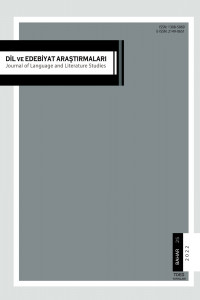THE EFFECTS OF GODS ON FATE AND THE CONCEPT OF FREE WILL IN ANCIENT GREEK IN THE LIGHT OF ILLIAD, ODDYSEY AND THEOGONIA
Abstract
The Iliad and Odyssey, which were written by Homer, are very important ancient Works that presenting the historical reality of the Ancient Greek era and the mythological world in harmony. One of the most important factors that make these works valuable is that while their plot describing one of the most important wars of ancient times the Trojan War they also reflect the perspectives of the Ancient Greeks on the perception of fate. Another important work that sheds light on the concept of fate and free will in Ancient Greece is Hesiod’s Theogonia. In this work, Hesiod explained the foundation of the universe and the journey of the creation from chaos to order with the myths of the emergence of the gods. It has been observed that human life was given much less place in Theogonia than in the Iliad and Odyssey. In this sense in Theogonia, it is better to examine the perception of fate at the level of immortals rather than mortals. The purpose of this study is to examine how the concept of fate, free will and the role of gods were handled in these three ancient works in detail. While these issues are being discussed, it is aimed to focus on the actions of man and gods and the relationship between them and the effects of their actions to the absolute end.
References
- Abad, Gemino (2003). Virgil Aeneas: The Roman Isead of Pietas. Smu Humanities & Social Sciences Working Paper Series, Singapore Management University, Paper No.6,1-8.
- Bayladı, Derman. (2004). Efsaneler Dünyasında Anadolu Mitolojisi. Say Yayınları. İstanbul.
- Beard, Mary (2016). Why Homer Was (Not) a Woman: The Reception of The Authoress of the Odyssey. A Critical Overwiev, Toronto University of Toronto Press, 317-342 https://doi.org/10.3138/9781442689053-016.
- Dietrich, C. Bernard (1979). Views of Homeric Gods and Religion. Numen, Brill, Vol. 26 (2), 129-151.
- Erhat, Azra (2012). Mitoloji Sözlüğü. Remzi Kitabevi. Ankara.
- Eyüboğlu, Sebahattin & Erhat, Azra (1977). Hesiodos Eseri ve Kaynakları. Türk Tarih Kurumu Yayınları. Ankara.
- Greene, William Chase (1944). Moria: Fate, GoodandEvil in Greek Thought. Harvard University Press. Cambridge, MA.
- Hesiodos (?). Theogonia. (Eyüboğlu, Sebahattin & Erhat, Azra Çev.1977). Türk Tarih Kurumu Yayınları. Ankara.
- Homeros (?). İlyada. (Abdullah Ersoy Çev. 2011). Panama Yayıncılık. Ankara.
- Homeros (?). Odysseia. (Abdullah Ersoy Çev. 2012). Panama Yayıncılık. Ankara.
- Jonston, Ian (2004). Lecture on Homer’s Odyssey. Vencouver Island University. http://johnstoi.web.viu.ca/introser/homer.htm
- Kulmann, Wolfgang (1985). Godsand Men in the Illiad and Odyssey. Harvard Studies in Classical Philology, Department of the Classics, Harvard University. Vol. 89, 1-23.
- Redfield, M. James (1994). Nature and Culture in the Illiad: TheTragedy of Hector.Chicago University Press. Chicago.
- Said, Suzanne (2011). Homer and the Odyssey. Oxford University Press, Oxford.
İlyada, Odysseia ve Theogonia Işığında Antik Yunan'da Tanrıların Kadere Etkisi ve Özgür İrade Kavramı
Abstract
Homeros tarafından yazılmış olan İlyada ve Odysseia, Antik Yunan çağının tarihi gerçekliğiyle, mitolojik dünyasını bir harmoni halinde sunan çok önemli Antik eserlerdir. Bu eserleri değerli kılan en önemli etmenlerden biri, temasının antik çağın en önemli savaşlarından biri olan Truva savaşını anlatırken Antik Yunanlıların inanç sisteminin bir parçası olan kader algısına bakış açılarını da yansıtmalarıdır. Antik Yunan’da kader olgusu ve özgür irade kavramına ışık tutan bir başka önemli eser ise Hesiodos tarafından yazılmış olan Theogonia’dır. Hesiodos bu eserinde evrenin kuruluşunu ve yaradılışın kaostan düzene geçiş yolculuğunu tanrıların ortaya çıkış mitleriyle anlatmıştır. Theogonia’da insan yaşamına İlyada ve Odysseia’den çok daha az yer verildiği gözlemlenmiştir. Bu bağlamda kader algısı Theogonia’da ölümlülerden çok ölümsüzler düzeyinde incelemek gerekmektedir. Bu çalışmanın amacı Antik Yunan’ın en önemli eserleri arasında yer alan İlyada, Odysseia ve Theogonia’da kader kavramının, özgür iradenin ve tanrıların rolünün işleniş biçemlerini ayrıntılı bir şekilde incelemektir. Bu konular ele alınırken insan ve tanrı eylemleri, aralarındaki ilişki ve mutlak sona etkileri çerçevesinde aktarılması amaçlanmıştır.
Keywords
References
- Abad, Gemino (2003). Virgil Aeneas: The Roman Isead of Pietas. Smu Humanities & Social Sciences Working Paper Series, Singapore Management University, Paper No.6,1-8.
- Bayladı, Derman. (2004). Efsaneler Dünyasında Anadolu Mitolojisi. Say Yayınları. İstanbul.
- Beard, Mary (2016). Why Homer Was (Not) a Woman: The Reception of The Authoress of the Odyssey. A Critical Overwiev, Toronto University of Toronto Press, 317-342 https://doi.org/10.3138/9781442689053-016.
- Dietrich, C. Bernard (1979). Views of Homeric Gods and Religion. Numen, Brill, Vol. 26 (2), 129-151.
- Erhat, Azra (2012). Mitoloji Sözlüğü. Remzi Kitabevi. Ankara.
- Eyüboğlu, Sebahattin & Erhat, Azra (1977). Hesiodos Eseri ve Kaynakları. Türk Tarih Kurumu Yayınları. Ankara.
- Greene, William Chase (1944). Moria: Fate, GoodandEvil in Greek Thought. Harvard University Press. Cambridge, MA.
- Hesiodos (?). Theogonia. (Eyüboğlu, Sebahattin & Erhat, Azra Çev.1977). Türk Tarih Kurumu Yayınları. Ankara.
- Homeros (?). İlyada. (Abdullah Ersoy Çev. 2011). Panama Yayıncılık. Ankara.
- Homeros (?). Odysseia. (Abdullah Ersoy Çev. 2012). Panama Yayıncılık. Ankara.
- Jonston, Ian (2004). Lecture on Homer’s Odyssey. Vencouver Island University. http://johnstoi.web.viu.ca/introser/homer.htm
- Kulmann, Wolfgang (1985). Godsand Men in the Illiad and Odyssey. Harvard Studies in Classical Philology, Department of the Classics, Harvard University. Vol. 89, 1-23.
- Redfield, M. James (1994). Nature and Culture in the Illiad: TheTragedy of Hector.Chicago University Press. Chicago.
- Said, Suzanne (2011). Homer and the Odyssey. Oxford University Press, Oxford.
Details
| Primary Language | Turkish |
|---|---|
| Journal Section | ARTİCLES |
| Authors | |
| Publication Date | March 23, 2022 |
| Acceptance Date | February 28, 2022 |
| Published in Issue | Year 2022 Issue: 25 |
Journal of Language and Literature Studies is licensed under the Creative Commons Attribution-Non-Commercial-NoDerivatives 4.0 International Licence (CC BY-NC-ND 4.0).

